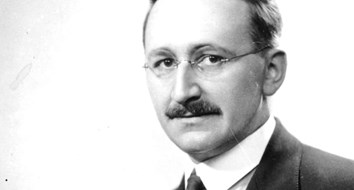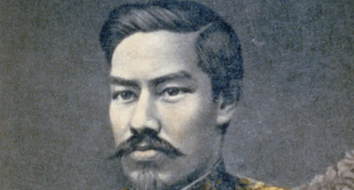"The Minimum Wage"
To make a horse drink
It is foolish to try;
It’s fully as hard
To make customers buy:
So, when prices are raised
By law or decree,
That sales will fall off
Is as sure as can be;
And if minimum wages
By commission are set
Above what the worker
Would naturally get,
Those worth the money
Alone will be hired,
While the lowest-grade labor
Will surely be fired,
And the jobless will sit
And wonder all day
Just what they have gained
From the high legal pay.
Those memorable lines are from Willford I. King (1880-1962) in his clever 1928 volume titled Economics in Rhyme. I learned of him for the first time just a couple weeks ago, while browsing the vast archives of FEE.org.
FEE reprinted “The Minimum Wage” in 1969. My curiosity about King was instantly aroused when I discovered it. Who was this man?, I asked myself. So I checked him out and now I’m a fan.
Born in Iowa the year that James A. Garfield was elected President of the United States, King graduated from the University of Nebraska in 1905 and then earned his doctorate in philosophy from the University of Wisconsin-Madison. Later, he moved east and served as a statistician with the US Public Health Service, as an economist for the National Bureau of Economic Research, and then as an economics professor at New York University.
Upon retirement from NYU in 1945, King became chairman of something called the Committee for Constitutional Government (CCG). The CCG was formed in 1937 in opposition to Franklin Roosevelt’s cynical attempt to pack the Supreme Court. It mounted a massive, nationwide education campaign against the scheme and could rightly claim to be an important factor in defeating it. It also opposed the worst of FDR’s New Deal legislation.
I typed “Willford King” into the search engine at FEE.org to see what else our archives might produce. To my surprise, many items came up, mostly essays King wrote for CCG on everything from labor monopolies to a thoughtful piece titled “Where Are Those Communists?” He suggested they weren’t all in Moscow or in the State Department—that in fact, lots of other people in our midst were advocating communist ideas without even knowing they originated with a nasty German scribbler who died decades before.
Quite a few of King’s essays and pamphlets, long out of print, are still available through abebooks.com and other sites that feature hard-to-find works. Many are statistical and demographic analyses but with eloquent elaborations in plain English.
The two books that most plainly reveal King’s economic sympathies are his Economics in Rhyme and The Keys to Prosperity. He believed broadly in private property, free enterprise, and limited government. In the latter book, he argued:
Laissez faire is the only system which enhances prosperity without lessening individual initiative or curtailing personal liberty. Thus far, socialism and fascism have succeeded only where they abolished liberty, and nowhere have they provided abundance.
Imagine my surprise when I was able to make this direct connection to King: In his Preface to The Keys to Prosperity, the author expressed his “appreciation of the valuable help given to him” by Dr. Orval Watts, among several other people.
Watts was the first full-time economist in the US ever hired by a chamber of commerce. He later served on the FEE staff with founder Leonard Read before moving to Midland, Michigan, to become director of economic education at Northwood University. (In 1977, he hired a young professor named Lawrence Reed to teach economics. I’ll forever be grateful to him for that!)
King was an economist and statistician who didn’t have to numb you with numbers to get his point across. His delightful Economics in Rhyme provides no numbers at all, but lots of wisdom presented in verse. Some publisher today should put it into print again. Short of that, I offer below a further sample from that little treasure:
"The Profiteer"
Oh, who’s this wicked scoundrel
We call the profiteer?
Why he’s the man who bought goods cheap
And later sold them dear.
But isn’t that exactly
What we all have tried to do?
Why yes, of course, but through ill-luck
Our plans have gone askew.
For what shall we indict him
That to court he may be haled?
Oh the charge is very simple;
He succeeded where we failed.
And what attorneys shall we hire?
We’ll need the very best
Who’ll have real interest in the case
And prosecute with zest.
To the firm of Pique and Envy
The task we shall assign
For cases of this type, you know
Are clearly in their line.
What judge can we depend upon
To give him his full due
To send the profiteer to jail
And all his henchmen too?
Thank Heaven, we’ve up on the bench
A man of proper kind—
The very judge to sit upon
The case we have in mind.
He’ll have no mercy for the crime
Full justice we’ll secure;
In the court of Judge Hypocrisy,
Conviction will be sure.
"Consumers Control Production"
With full competition
And freedom of trade,
Each dollar, as spent,
Votes what shall be made.
A thousand commissions,
Working daytime and night,
Could not guide production
So nearly aright.
"Protection and Wages"
“Father, I heard a speaker,
Last night on the radio,
Who talked about ‘protection’,
And why we need it so.
He said, American workers,
At five dollars, each, per day,
Cannot compete with those abroad
Who get a third the pay;
Hence, we must have a tariff
Our standards to maintain,
Or wages here will meager be
And poverty will reign.”
“My son, I fear that speaker
Is something of a quack;
For, of economic knowledge,
He surely shows a lack.
That he has his logic twisted,
Can be said without ado;
Since he states that costs make prices,
When the opposite is true.
For the wage that the steel-maker
To a workingman can pay,
Depends upon the price of steel;
‘Tis not the other way.
Our iron ore is abundant;
Our coal is plenty too;
And machinery is everywhere
The heavy tasks to do;
So each man is made efficient—
Turns out a tonnage great—
And that’s the very reason
He’s paid so high a rate.”
"Unprofitable Industries"
If, without protection or bounties,
An industry can not survive,
It’s foolish to waste time and money
In trying to keep it alive.
Even though it be hard on the people
Who on that line of work must depend,
The drain on the national income
Should quickly be brought to an end.
Equipment can often be salvaged—
New callings by workers be learned;
The sooner the ordeal is over,
The better for all who’re concerned.
"Dumping"
To favor the local producer;
In the home market to buy;
Are policies sometimes quite costly
And seldom should strictly apply.
So when cheap foreign goods flood our markets—
Come into our ports without end—
The best way to punish the aliens
Is to buy all the goods they can send.
To buy where the goods are the cheapest;
To sell where best prices obtain;
Is the surest way, in the long run,
To strengthen prosperity’s reign.





